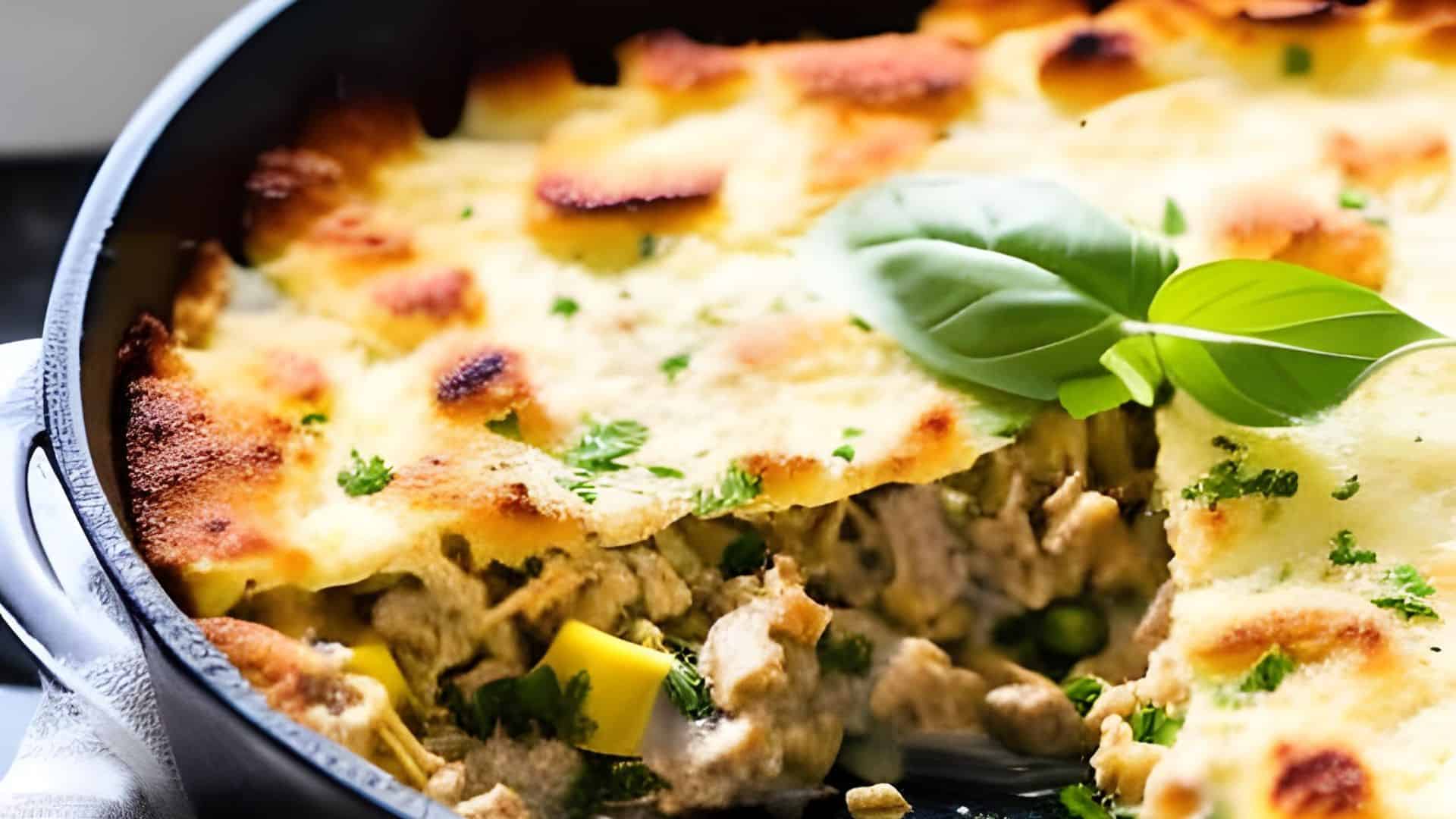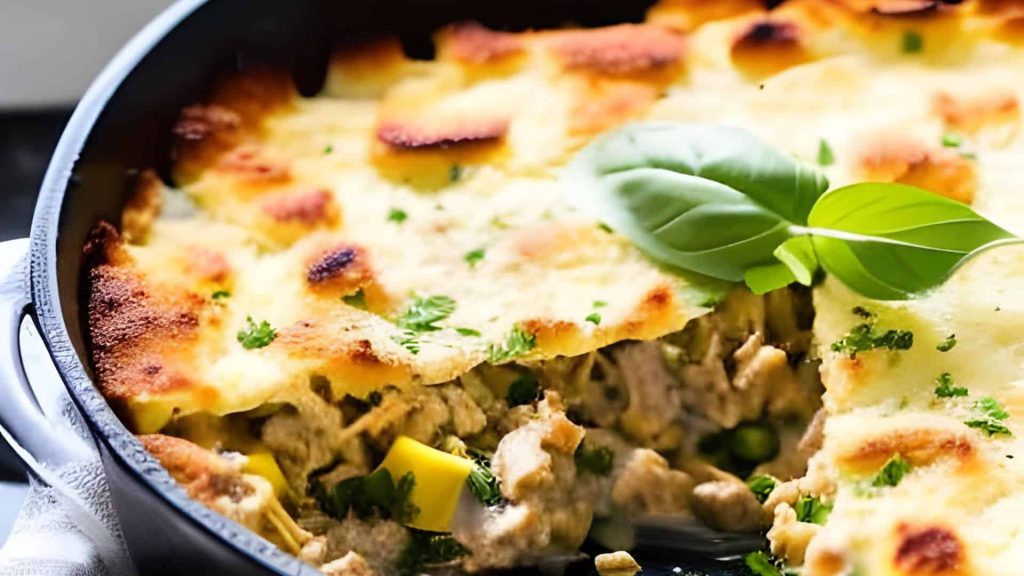KETO TUNA CASSEROLE

Delicious and Satisfying Keto Tuna Casserole: A Flavorful Twist Without Noodles
Indulge in the delightful and satiating keto tuna casserole that is packed with incredible flavors, all while omitting traditional noodles.
With a mere 30-minute preparation time and the use of readily available everyday ingredients, this effortless recipe is an ideal choice for a quick and delectable weeknight dinner.

Canned tuna holds a special place among my cherished ingredients. Its delectable flavor, satisfying nature, and exceptional affordability make it an unparalleled choice in my culinary repertoire.
Additionally, its ever-present status in my pantry ensures that it consistently rescues me from those moments when the refrigerator seems desolate. I skillfully utilize this versatile treasure to craft delightful creations such as savory tuna cakes and refreshing tuna salad.
Moreover, I have discovered a culinary gem in the form of a remarkable tuna casserole. This tantalizing dish possesses a unique quality - it eschews the inclusion of noodles, yet its absence is hardly noticed amidst the symphony of flavors.
With a remarkably effortless preparation process, minimal chopping becomes the sole requirement for this lazily luxurious casserole. Remarkably, it quickly reaches culinary perfection, rendering it an ideal choice for those bustling weeknight dinners that demand both efficiency and satiety.
Ingredients
This delightful creation features a harmonious blend of canned tuna, finely chopped red onion, creamy mayonnaise, and a generous portion of cheese, all baked to perfection until achieving a mesmerizing golden hue with a tantalizingly bubbly texture.
Please refer to the recipe card below for precise measurements:
- Canned tuna: For this recipe, I highly recommend using skipjack tuna, renowned for its exceptional flavor and texture that perfectly complements the other ingredients.
- Mayonnaise: To achieve a lusciously creamy consistency, I prefer utilizing avocado oil mayonnaise. Its rich flavor and smooth texture add an exquisite touch to the dish.
- Dijon mustard: In comparison to yellow mustard, Dijon mustard boasts a creamier profile with less vinegar notes. Opting for Dijon mustard enhances the overall taste and texture of the dish, making it a preferred choice.
- Shredded Gruyere cheese: While other melty cheeses like cheddar or provolone can be employed, Gruyere cheese brings forth an exceptional depth of flavor, elevating the dish to new heights. Its distinct character harmonizes flawlessly with the other ingredients.
- Chopped red onion: It is crucial to finely chop the red onion, ensuring that it blends seamlessly with the other components. The aromatic essence of the onion enhances the overall taste, adding a delightful note to the dish.
- Seasonings: To achieve the perfect balance of flavors, a careful selection of seasonings is employed. Salt, black pepper, and a hint of cayenne pepper are added. Although the casserole remains moderately spiced, the cayenne pepper provides a subtle, delightful kick that awakens the taste buds, leaving a lasting impression.
- Chopped parsley: While primarily utilized for garnishing purposes, chopped parsley contributes more than just visual appeal. It imparts a burst of freshness and adds a vibrant splash of color to the dish, enhancing its overall presentation.
Variations
You have the option to incorporate tuna in olive oil as an alternative to the traditional tuna in water. This choice not only adds a delightful twist but also enhances the overall flavor of the dish. Experimenting with ingredients can lead to surprising and delectable results!
When preparing the recipe, consider substituting mayonnaise with sour cream. Both options serve the purpose, but in my personal opinion, mayonnaise offers a slightly more appealing taste. However, feel free to explore and decide which option suits your palate best.
For an extra burst of flavor, don't forget to include dill in this recipe. Its aromatic and refreshing qualities make it a wonderful addition that complements the other ingredients perfectly. The infusion of dill elevates the dish to new levels of tastefulness.
If you are unable to find Gruyere cheese, fret not! There are excellent substitutes that can fill its role. Sharp cheddar or provolone make fantastic alternatives that provide a similar rich and savory profile. Another alternative that never fails to impress is smoked Gouda, which imparts a distinct and delightful smoky note to the dish.
By exploring these ingredient variations, you can elevate your culinary experience and embark on a flavorful journey that is both enjoyable and satisfying.
Preparation Instructions
Follow the detailed instructions provided in the recipe card below, and you'll be on your way to savoring a scrumptious meal. Let's delve into the step-by-step process:
- Begin by gathering all the necessary ingredients. In a large mixing bowl, combine all the components, ensuring you set aside a portion of the cheese and parsley for later use. To get a visual reference, refer to Photos 1 and 2.
- Once the ingredients are combined, carefully transfer the mixture into a small baking dish. For an enticing finishing touch, generously sprinkle the reserved cheese over the top. This step is illustrated in Photo 3, giving you a clear idea of what to expect.
- Preheat your oven to 400°F (200°C) and place the casserole inside. Allow it to bake until it reaches the desired temperature throughout, usually taking around 15 minutes. Feel free to use the images in Photos 4 to 6 as a visual guide to ensure you're on the right track.
- Once the casserole is perfectly heated and the cheese has achieved a delectable golden hue, carefully remove it from the oven. To add a vibrant touch to the presentation, garnish the dish with a sprinkle of freshly chopped parsley. This final step enhances both the aesthetics and the flavor profile of the casserole.

Expert Tip
You can enhance the volume of this delightful casserole by incorporating 2 cups of meticulously cooked riced cauliflower. This addition not only adds a nutritious twist but also contributes to a satisfyingly substantial meal.
To complement the increased quantity, adjust the amount of mayonnaise to ½ cup, ensuring a balanced and flavorful outcome.
Finally, to create convenient portions, divide the casserole into 3 equally-sized servings. This step allows for easy portion control and offers a convenient solution for sharing or storing leftovers.
Serving Suggestions
This delectable casserole is incredibly indulgent and satisfying. As indicated in the recipe card provided, each serving of this delightful dish contains a total of 465 calories, making it a substantial and fulfilling meal option.
To complement its flavors and enhance the overall experience, I recommend serving it alongside a vibrant array of freshly cut vegetables, perfect for scooping out portions directly from the baking dish or onto a plate.
Additionally, for an added burst of freshness and a touch of green, a side of microwave broccoli pairs exceptionally well with this casserole, creating a harmonious balance of textures and flavors on your plate.
Storage Instructions (Fridge)
The leftovers can be stored in the refrigerator for a span of 3-4 days. Ensure that you place them in an airtight container or wrap them tightly with plastic wrap to maintain their freshness.
This way, you can enjoy them for a few more days without compromising their taste.
Freezing for Extended Storage
If you wish to keep the leftovers for a longer period, freezing is a great option. Prepare them for freezing by placing them in a freezer-safe container or wrapping them securely with aluminum foil or freezer bags.
Label the containers with the date for easy identification later on. The leftovers can be stored in the freezer for up to three months without significant loss in quality.
Reheating in the Oven
To reheat the leftovers, preheat your oven to 300°F (150°C). Transfer the desired amount of leftovers to an oven-safe dish or baking tray, ensuring they are evenly spread out. Cover the dish with foil to prevent excessive drying or browning.
Place the dish in the preheated oven and gently reheat for approximately 15-20 minutes, or until the leftovers are heated through. The low temperature helps maintain the texture and flavors of the dish while ensuring even heating.
Reheating in the Microwave
If you prefer a quicker method, you can also reheat the leftovers in the microwave. Place the desired portion in a microwave-safe dish and cover it with a microwave-safe lid or microwave-safe plastic wrap.
Set the microwave power to 50% (medium) to avoid overheating or drying out the leftovers. Microwave for 1-2 minutes, then carefully stir the dish. Continue microwaving in short intervals, stirring occasionally, until the leftovers are thoroughly heated.
Recipe Card
- 2 (5 oz) cans tuna in water (drained)
- 1/3 cup avocado oil mayonnaise
- 1 tbsp Dijon mustard
- 1/2 cup Gruyere cheese (shredded, divided)
- 1/4 cup red onion (minced)
- 1/4 tsp sea salt
- 1/4 tsp black pepper
- 1/4 tsp cayenne pepper
- 1/4 cup parsley (chopped, for garnish)
Start by preheating your oven to 400°F. This will ensure that the dish bakes at the right temperature, resulting in a delicious outcome.
In a mixing bowl, combine the tuna, mayonnaise, mustard, ¼ cup of shredded cheese, onion, salt, pepper, and cayenne. Mix these ingredients together until they are well incorporated. This step is crucial for achieving a balanced and flavorful tuna mixture.
Take a small, 1-quart casserole dish and transfer the tuna mixture into it. Spread it evenly across the dish, ensuring that it is distributed in a consistent layer. This will help with even cooking and ensure that every bite is equally delicious.
Now it's time to bake the dish. Place the casserole dish in the preheated oven and let it bake for approximately 15 minutes. Keep an eye on it to avoid overcooking. The baking process will heat up the mixture, melt the cheese, and create a creamy and satisfying texture.
Once the casserole is hot and the cheese has melted, carefully remove it from the oven. To add a pop of freshness and color, sprinkle the top with parsley. This will not only enhance the visual appeal of the dish but also provide a touch of herbal flavor.
Serve the tuna casserole immediately while it's still hot. It pairs well with cut-up vegetables like carrots, cucumbers, or bell peppers, which add a refreshing crunch.
Alternatively, you can also serve it with pork rinds, which provide a satisfyingly crispy texture. These accompaniments can be used for scooping out the casserole and add variety to the overall dining experience.
Servings 2
- Amount Per Serving
- Calories 465kcal
- % Daily Value *
- Total Fat 36g56%
- Saturated Fat 10g50%
- Sodium 882mg37%
- Total Carbohydrate 2g1%
- Sugars 5g
- Protein 33g66%
* Percent Daily Values are based on a 2,000 calorie diet. Your daily value may be higher or lower depending on your calorie needs.
To make this casserole more substantial, follow these steps:
-
Cook 2 cups of riced cauliflower. Make sure it is fully cooked and tender.
-
Take the prepared casserole and increase the amount of mayonnaise to ½ cup. This will add more creaminess and flavor to the dish.
-
Once the adjustments are made, divide the casserole into 3 equal servings. This will help portion control and make it easier to serve.
-
If you have leftovers, store them in the refrigerator. The casserole will stay fresh for 3-4 days.
-
Alternatively, if you want to store the leftovers for a longer period, you can freeze them. The frozen casserole will remain good for up to three months.
-
When you're ready to enjoy the leftovers, gently reheat them. You can use either the oven or the microwave.
-
Oven method: Preheat your oven to 300°F (150°C). Place the casserole in an oven-safe dish and cover it with aluminum foil. Heat it in the oven for a suitable amount of time, usually until it is thoroughly warmed through.
-
Microwave method: Place the desired amount of casserole in a microwave-safe dish. Set the microwave power to 50% to ensure even reheating. Microwave the casserole in short intervals, stirring occasionally, until it reaches the desired temperature.
-
